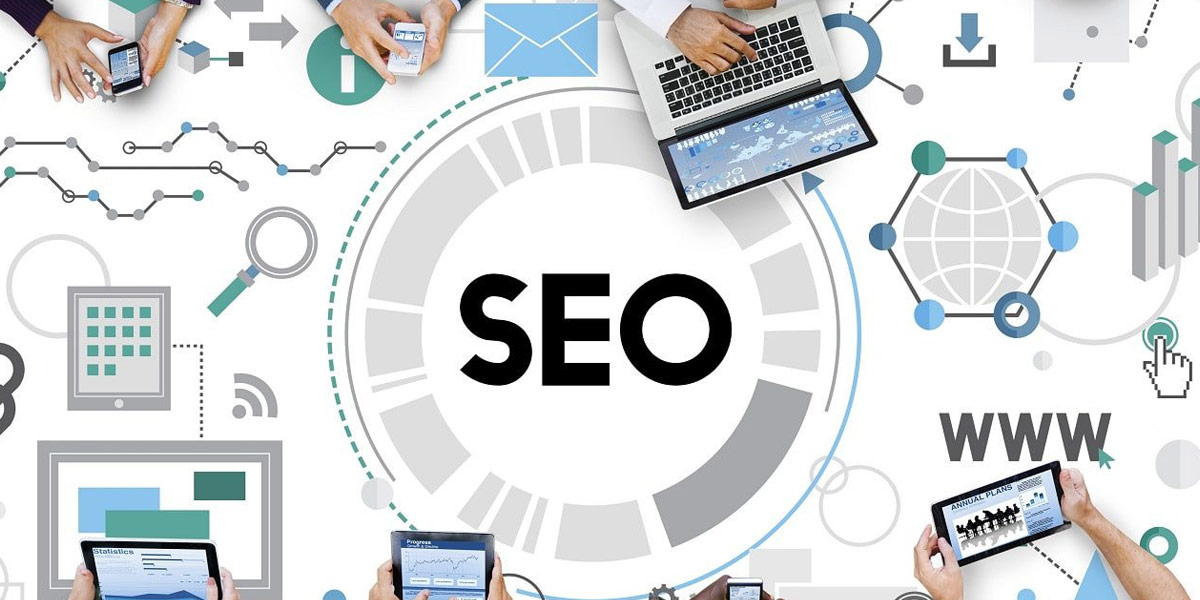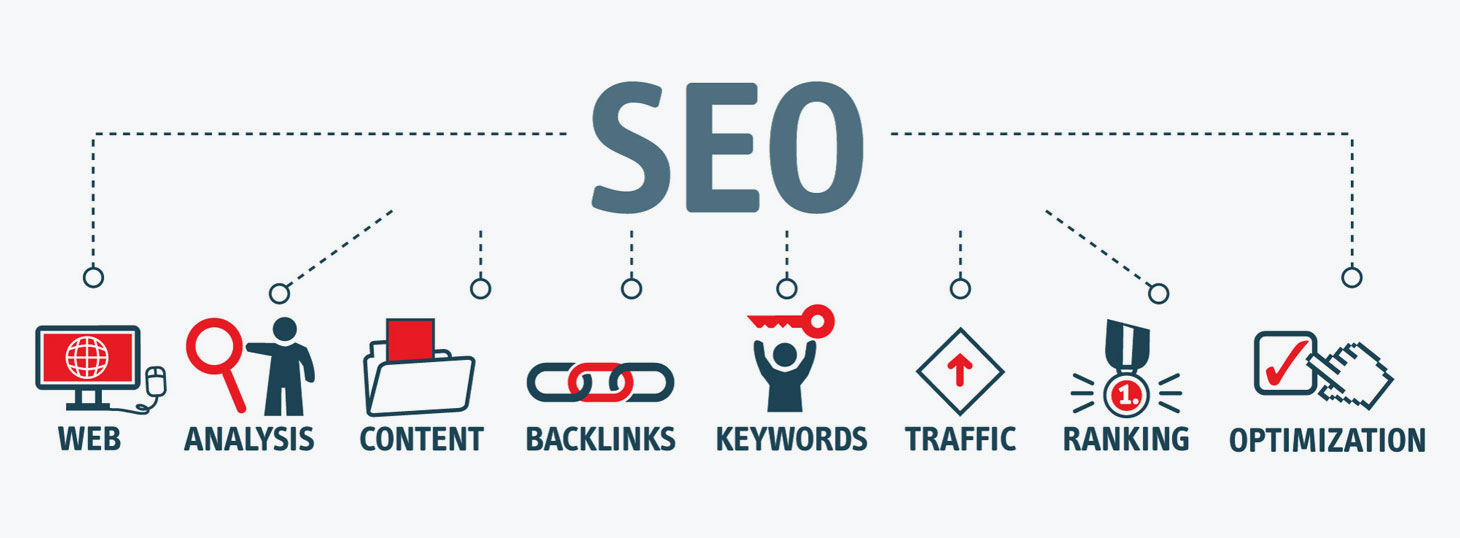
SEO (Search Engine Optimization) plays a vital role in the success of any business operating in the digital realm. In today’s competitive online landscape, having a strong online presence and visibility is crucial for attracting customers and driving business growth. In this article, we will explore how SEO can significantly benefit your business and contribute to its long-term success.
How Does SEO Help Your Business Grow?
Search engines have become the go-to resource for information, products, and services, so having a solid SEO strategy is paramount. SEO refers to the practice of optimizing your website and online content to make them more visible and relevant to search engines. By aligning with search engine algorithms and user intent, SEO helps businesses achieve higher organic search rankings, increased web traffic, and ultimately, improved conversions.

How Does SEO Help Your Business Grow?
Boosts Credibility
One of the primary advantages of implementing a robust SEO strategy is that it boosts the credibility of your business. When your website appears among the top search results for relevant keywords, users perceive your business as trustworthy and authoritative. Higher search rankings imply that search engines consider your website reliable and worthy of being displayed prominently. This increased credibility translates into increased user trust, leading to higher click-through rates and improved business prospects.
Increases Web Traffic
Web traffic serves as the lifeblood of any online business. A well-executed SEO strategy can significantly increase the number of people visiting your website. By optimizing your website’s structure, content, and meta tags, SEO makes it more visible and accessible to search engine users. When your website ranks higher in search engine results pages (SERPs), it attracts a larger share of organic traffic. Increased web traffic opens up more opportunities for lead generation, customer acquisition, and sales growth.
Supports Content Marketing
Content marketing is a powerful strategy for attracting, engaging, and retaining customers. SEO and content marketing go hand in hand, as SEO supports content discovery and consumption. By optimizing your content for relevant keywords and ensuring proper on-page and off-page SEO techniques, you can make your content more visible to search engine users. This increased visibility leads to higher organic traffic, increased social shares, and improved engagement metrics, such as time on page and bounce rate.
Maximizes PPC Campaigns
Pay-per-click (PPC) advertising is an effective way to drive targeted traffic to your website. However, the effectiveness of PPC campaigns heavily relies on the quality and relevance of landing pages. This is where SEO comes into play. By optimizing landing pages for SEO, you can enhance their quality, relevance, and user experience. When landing pages align with user intent and provide a seamless browsing experience, they maximize the ROI of your PPC campaigns, leading to higher conversions and lower acquisition costs.

How Does SEO Help Your Business Grow: Maximizes PPC Campaigns
Builds Trust and Credibility
In today’s competitive business landscape, establishing trust and credibility is crucial for winning over customers. A strong SEO strategy can contribute significantly to building trust in your brand. When your website consistently appears among the top search results, users perceive it as reliable and authoritative. SEO incorporates trust signals such as quality backlinks, positive user reviews, and social proof, which further strengthen your brand’s credibility. By establishing trust, SEO helps create a positive brand image and fosters long-term customer loyalty.
Improves User Experience
User experience (UX) is a critical factor that determines the success of your website. SEO plays a vital role in enhancing the user experience by making your website faster, more user-friendly, and easier to navigate. Search engines favour websites that provide a seamless and enjoyable user experience. By optimizing page load times, implementing responsive design, and improving site navigation, SEO improves the overall usability and satisfaction of your website visitors. A positive user experience leads to higher engagement, lower bounce rates, and increased conversions.
Increases Brand Awareness
Building brand awareness is essential for expanding your business reach and attracting new customers. SEO can significantly contribute to increasing your brand’s visibility and awareness. When your website consistently appears in top search results, users are more likely to recognize and remember your brand. Improved brand visibility leads to increased brand recall, both consciously and subconsciously. By optimizing your website and content for relevant keywords, you can ensure that your brand remains visible to potential customers throughout their online search journeys.
Provides Long-Term Equity
Unlike other forms of online marketing that offer short-term benefits, SEO provides long-term equity for your brand. By establishing a strong foundation for your website and digital properties, SEO sets the stage for sustainable growth and visibility. A well-executed SEO strategy involves optimizing not only your website’s structure and content but also your off-page presence, including backlinks and social media signals. By continuously monitoring and adapting your SEO efforts to industry trends and algorithm updates, you can maintain a competitive edge and secure long-term success.
Increases Revenue
Ultimately, the success of any business is measured by its revenue generation. SEO can significantly impact your revenue by attracting more qualified inbound traffic to your website. When your website ranks higher in search engine results for relevant keywords, it drives targeted traffic that is more likely to convert into customers. By optimizing your website for conversion through effective call-to-actions, persuasive copywriting, and user-friendly design, you can maximize the revenue potential of your SEO efforts. The higher the organic traffic and conversion rates, the more revenue your business can generate.

How Does SEO Help Your Business Grow: Increases Revenue
Conclusion
SEO is an invaluable tool for businesses aiming to thrive in the digital landscape. By harnessing the power of SEO, you can boost your business’s credibility, increase web traffic, support content marketing efforts, maximize PPC campaigns, build trust and credibility, improve user experience, increase brand awareness, provide long-term equity, and ultimately, increase your revenue. Investing in a well-planned and executed SEO strategy is a worthwhile endeavour that can yield significant and sustainable benefits for your business.
FAQs
What is SEO and how does it work?
SEO stands for Search Engine Optimization. It is the practice of optimizing your website and online content to make it more visible and relevant to search engines. SEO works by aligning your website with search engine algorithms and user intent. It involves various techniques such as keyword research, on-page optimization, link building, and technical optimizations to improve your website’s ranking in search engine results pages (SERPs).
How can SEO help my business attract more customers?
SEO can help your business attract more customers by increasing your website’s visibility on search engines. When your website ranks higher in search results for relevant keywords, it attracts more organic traffic from users actively searching for products or services like yours. By optimizing your website’s content and structure to align with user intent, you can capture the attention of potential customers and drive them to your website, increasing the chances of conversions and sales.
What are the benefits of SEO for my business?
Implementing a strong SEO strategy offers several benefits for your business. It boosts your credibility and trustworthiness, increases web traffic, supports content marketing efforts, maximizes the effectiveness of PPC campaigns, improves user experience, increases brand awareness, provides long-term equity for your brand, and ultimately, increases revenue. These benefits work together to enhance your online presence, attract more customers, and drive business growth.
How can SEO improve my website’s visibility on search engines?
SEO improves your website’s visibility on search engines through various techniques. It involves optimizing your website’s content with relevant keywords, improving meta tags, headers, and URLs, enhancing website speed and performance, obtaining quality backlinks from authoritative websites, and ensuring mobile-friendliness and responsive design. These optimizations signal search engines that your website is relevant, trustworthy, and user-friendly, leading to higher rankings and increased visibility on search engine results pages.
How can SEO help my business stand out from competitors?
In a highly competitive online landscape, SEO can help your business stand out from competitors. By implementing effective SEO strategies, you can differentiate your website and brand by offering valuable and relevant content, optimizing user experience, and building trust and credibility. SEO allows you to target specific keywords and demographics, ensuring that your website appears prominently when potential customers search for related products or services. A strong SEO presence sets you apart from competitors and increases your chances of capturing customer attention and loyalty.
What are some best practices for implementing SEO on my website?
Implementing SEO best practices is crucial for maximizing the effectiveness of your efforts. Some key practices include conducting thorough keyword research to identify relevant and high-volume keywords, optimizing on-page elements such as meta tags, headers, and URLs, creating high-quality and engaging content, improving website speed and mobile-friendliness, building authoritative backlinks, and regularly monitoring and analyzing your SEO performance. Staying updated with search engine algorithm changes and industry trends is also important to adapt your strategies accordingly.
How long does it take to see results from SEO efforts?
The time it takes to see results from SEO efforts can vary based on several factors. Generally, it takes time for search engines to crawl and index your website, evaluate its relevance and authority, and adjust your rankings accordingly. SEO is a long-term strategy that requires consistent effort and ongoing optimization. While some improvements may be noticeable within a few weeks, significant results often take several months to a year, depending on the competitiveness of your industry and the scope of your SEO efforts.
How much does SEO cost and is it worth the investment?
The cost of SEO can vary depending on various factors, including the size of your website, the scope of optimization required, and whether you choose to handle it in-house or hire an SEO agency. SEO costs can range from a few hundred dollars per month for small businesses to several thousand dollars per month for larger enterprises. It’s important to consider SEO as an investment rather than a cost. When implemented effectively, SEO has the potential to deliver a high return on investment by driving organic traffic, attracting customers, and increasing revenue.
How can I measure the success of my SEO efforts?
Measuring the success of your SEO efforts requires tracking relevant metrics and key performance indicators (KPIs). Some essential metrics to monitor include organic search traffic, keyword rankings, conversion rates, bounce rates, time on page, and backlink profile. Tools like Google Analytics, Google Search Console, and SEO-specific platforms provide valuable insights into these metrics. By regularly analyzing and interpreting these data points, you can assess the effectiveness of your SEO strategies, identify areas for improvement, and make data-driven decisions to optimize your website’s performance.
How can SEO work together with other marketing strategies to benefit my business?
SEO can complement and work synergistically with other marketing strategies to benefit your business. By integrating SEO with content marketing, social media marketing, email marketing, and PPC advertising, you can amplify the reach and impact of your overall marketing efforts. For example, SEO can optimize your content to make it more discoverable and shareable, while social media marketing can promote that content to a wider audience. PPC campaigns can leverage SEO-optimized landing pages to maximize conversions. By aligning these strategies, you create a cohesive and comprehensive marketing approach that generates greater visibility, engagement, and conversions for your business.

With over two decades of web design and development expertise, I craft bespoke WordPress solutions at FallingBrick, delivering visually striking, high-performing websites optimised for user experience and SEO.




